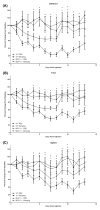Effects of 5-fluorouracil chemotherapy on fatigue: role of MCP-1
- PMID: 23085145
- PMCID: PMC3711245
- DOI: 10.1016/j.bbi.2012.10.012
Effects of 5-fluorouracil chemotherapy on fatigue: role of MCP-1
Abstract
Chemotherapy has been known to cause severe side effects, including fatigue. While the mechanisms for chemotherapy induced fatigue (CIF) are likely to be multi-factorial in origin, it is thought that inflammation and anemia may play a role. The purpose of this study was to examine the effect of chemotherapy on fatigue in mice, and further, to begin to determine if inflammation and anemia may contribute to this response. For experiment 1, C57BL/6 mice were assigned to: vehicle (PBS), low (20 mg/kg), medium (40 mg/kg), or high (60 mg/kg) doses of 5-fluorouracil (5-FU). Voluntary physical activity (PA) was measured throughout the treatment period (day 1-5) as well as during the recovery period (day 6-14). In experiment 2, we examined the effects of 5-FU (60 mg/kg) on the inflammatory mediator MCP-1 and on markers of anemia (RBC, Hct and Hb). Finally, using MCP-1(-/-) mice we examined the role of MCP-1 on CIF (experiment 3). 5-FU reduced voluntary PA in a dose response manner (p<0.05). Plasma MCP-1 was increased following 5-FU treatment on both days 5 (p=0.10) and 14 (p<0.05). In addition, RBCs, Hct and Hb were reduced with 5-FU on days 5 and 14 (p<0.05). Both C57BL/6 and MCP-1(-/-) mice saw similar decrements in PA through the duration of the treatment period (days 1-5), however the MCP-1(-/-) mice recovered much earlier than wildtype mice. This study provides evidence of the dose response effect of a standard chemotherapy agent on fatigue and demonstrates a potential role of MCP-1 and presumably inflammation, and anemia.
Copyright © 2012 Elsevier Inc. All rights reserved.
Figures


Similar articles
-
Dietary quercetin reduces chemotherapy-induced fatigue in mice.Integr Cancer Ther. 2014 Sep;13(5):417-24. doi: 10.1177/1534735414523315. Epub 2014 Mar 13. Integr Cancer Ther. 2014. PMID: 24626097 Free PMC article.
-
5-HT₃ receptor antagonists ameliorate 5-fluorouracil-induced intestinal mucositis by suppression of apoptosis in murine intestinal crypt cells.Br J Pharmacol. 2013 Mar;168(6):1388-400. doi: 10.1111/bph.12019. Br J Pharmacol. 2013. PMID: 23072534 Free PMC article.
-
Neutrophil recruitment is critical for 5-fluorouracil-induced diarrhea and the decrease in aquaporins in the colon.Pharmacol Res. 2014 Sep;87:71-9. doi: 10.1016/j.phrs.2014.05.012. Epub 2014 Jun 25. Pharmacol Res. 2014. PMID: 24972040
-
Weekly high-dose infusional 5-fluorouracil (HD-5-FU) combinations in the treatment of advanced breast cancer: results of phase I/II studies with weekly 24-hour infusion of HD-5-FU plus high-dose folinic acid (FA) alone and in combination with paclitaxel and cisplatin.J Infus Chemother. 1996 Summer;6(3):127-32. J Infus Chemother. 1996. PMID: 9229323 Review.
-
Severe cardiotoxicity during 5-fluorouracil chemotherapy: a case and literature report.Am J Clin Oncol. 1999 Oct;22(5):466-70. doi: 10.1097/00000421-199910000-00009. Am J Clin Oncol. 1999. PMID: 10521060 Review.
Cited by
-
Neuroimmunology of Behavioral Comorbidities Associated With Cancer and Cancer Treatments.Front Immunol. 2018 Jun 7;9:1195. doi: 10.3389/fimmu.2018.01195. eCollection 2018. Front Immunol. 2018. PMID: 29930550 Free PMC article. Review.
-
5-Fluorouracil disrupts skeletal muscle immune cells and impairs skeletal muscle repair and remodeling.J Appl Physiol (1985). 2022 Oct 1;133(4):834-849. doi: 10.1152/japplphysiol.00325.2022. Epub 2022 Aug 25. J Appl Physiol (1985). 2022. PMID: 36007896 Free PMC article.
-
The Acute Effects of 5 Fluorouracil on Skeletal Muscle Resident and Infiltrating Immune Cells in Mice.Front Physiol. 2020 Dec 7;11:593468. doi: 10.3389/fphys.2020.593468. eCollection 2020. Front Physiol. 2020. PMID: 33364975 Free PMC article.
-
Taltirelin alleviates fatigue-like behavior in mouse models of cancer-related fatigue.Pharmacol Res. 2017 Oct;124:1-8. doi: 10.1016/j.phrs.2017.07.012. Epub 2017 Jul 15. Pharmacol Res. 2017. PMID: 28720519 Free PMC article.
-
Dietary quercetin reduces chemotherapy-induced fatigue in mice.Integr Cancer Ther. 2014 Sep;13(5):417-24. doi: 10.1177/1534735414523315. Epub 2014 Mar 13. Integr Cancer Ther. 2014. PMID: 24626097 Free PMC article.
References
-
- Balkwill FR, Mantovani A. Cancer-related inflammation: common themes and therapeutic opportunities. Semin Cancer Biol. 2012;22 (1):33–40. - PubMed
-
- Barclay BJ, DeHaan CL, Hennig UG, Iavorovska O, von Borstel RW, von Borstel RC. A rapid assay for mitochondrial DNA damage and respiratory chain inhibition in the yeast Saccharomyces cerevisiae. Environ Mol Mutagen. 2001;38 (2–3):153–158. - PubMed
-
- Birgegård G, Aparo M, Bokemeyer C, Dicato M, Drings P, Hornedo J, Krzakowski M, Ludwig H, Pecorelli S, Schmoll H, Schneider M, Schrijvers D, Shasha D, Van Belle S. Cancer-related anemia: pathogenesis, prevalence and treatment. Oncology. 2005;68 (1):3–11. - PubMed
MeSH terms
Substances
Grants and funding
LinkOut - more resources
Full Text Sources
Other Literature Sources
Medical
Miscellaneous

